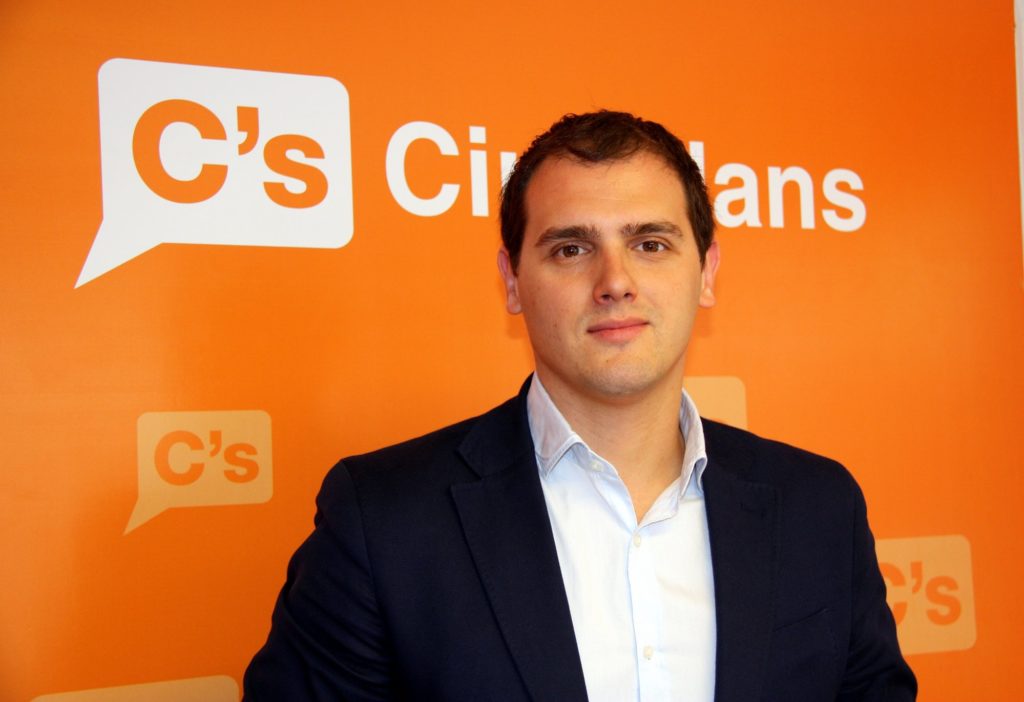The appeal of the centre
Ciudadanos leader Albert Rivera wants to become the Spanish Macron

Many European countries are suffering from political instability as of late. Just to name a few examples: Germany is waiting for the SPD base to approve the coalition deal following months of uncertainty after the general elections in September; Italy seems to be heading towards ungovernability as well; Westminster bungled the snap elections and ended up in coalition with the Northern Irish unionists of the DUP holding up the government majority, and France is enjoying a period of stability and reforms but mostly thanks to their electoral system.
Specifically, before Emmanuel Macron’s victory, the campaign was dividing experts and pollsters everywhere as to who was going to go to the heads-up confrontation with the centre-right, the far-left, the far-right and Macrons party En Marche all scoring around 20% of the votes. Indisputably the great losers of that election were the Socialist party (down to 4% after Hollande’s majority just four years prior) followed by the Republican Party who got excluded from the final showdown.
Perhaps the French scenario is just the clearest example of a widespread phenomenon in western democracies, which is the crisis of the traditional left/right political division and the inability of the historical parties to adapt to the time. Moreover, France’s success story is not replicable in the countries with a proportional electoral system, which ends up in a gridlock between the “new” parties and the old guards, often splitting both on this axes and the old left/right one. This is clear for example in Italy which has now become a 3-party system with one-third being further divided between Eurosceptic far-right and Europhile centre-right but with none of the three able to form a government by themselves, and yet unwilling (at least prior to the vote) to compromise and form a coalition which, as we have seen in Germany, is far from an easy or popular task.
One party that seems to be following macron steps is Ciudadanos, with its leader Albert Rivera mix of ambitions and political savvy. The movement, founded ten years ago by Rivera himself, has rapidly moved from the local to the national dimension and has successfully, together with Podemos, broke the old bi-partisan system that has ruled Spain since the fall of Franco’s dictatorship. The 38 years old Catalan from Barcelona has brought the party to the top of the poll with 28%, while PM Mariano Rajoy party is projected at 21%, the socialists at 20% and the anti-establishment Podemos trailing back at almost 17%.
The Catalan crisis offered Rivera a great opportunity which he promptly seized. He established himself as more inflexible than Rajoy towards Barcelona’s independence desires and as such has gained the votes of the Catalan unionists as well as to man Spanish citizen who sees him as a true defender of national unity. On top of this, he showed the ability to mediate and not get stuck on principles. For example, at the eve of the vote in 2015 he stated clearly his unwillingness to participate in a government together with Rajoy and yet, after the chaos of two failed consultations and one year without a government, he agreed to help the Partido Popular to avoid chaos and “for the good of the country”. This move alone distinguishes itself from the purism of the Five Star Movement in Italy and many other parties and leader around Europe, but is a double edged sword which can easily (as seen in Germany’s coalition talks) backfire.
For the moment, his tactic is paying off and it seems he’s yet to truly reveal his full power. Rajoy, even with a weak government, can benefit from an economy that is back on track and from the support from the other European leaders as demonstrated during the Catalan crisis. Yet it is estimated that the PSOE and the PP lost around 8 million votes in the last ten years while Ciudadanos has only gathered around three million in the 2016 elections. There is room for improvement, but if Rivera is able to pump up his numbers in the near future, he could very well not only become the Spanish Macron, but ally with the man itself in his endeavor to reform the EU and even aim at a central role in forming a new party in time for the European elections next year.
The old dichotomy is not working anymore. The historical parties, based on decades-old ideologies, are struggling to keep up and will meet their fate soon rather than later if they are unable to reform. Will the new kids on the block steal all the spotlights or is this a temporary coup? Only time will tell. The game is on, who’s playing and who is watching?
